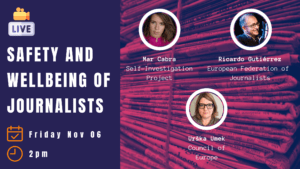
We are pleased to announce CMPF’s webinar titled “Safety and Wellbeing of Journalists in Times of Covid-19”. The webinar is part of the 9th edition of the annual School for Journalists and Media Practitioners organised by the Centre for Media Pluralism and Freedom (CMPF), at the European University Institute, and will be held online on November, 6th 2020, at 14:00.
Chair:
- Prof. Pier Luigi Parcu, Director of the Centre for Media Pluralism and Media Freedom
Speakers:
- Urška Umek (Head of Media Unit, Information Society Department, Council of Europe)
- Ricardo Gutiérrez (General Secretary, European Federation of Journalists)
- Mar Cabra (journalist, founder of The Self-Investigation project)
The COVID-19 crisis has highlighted more than ever the importance of professional journalism and quality reporting in our contemporary societies. The CMPF’s Media Pluralism Monitor 2020 has found that the poor working conditions of journalists and the increasing number of threats to which journalists are subjected pose some of the greatest risks to journalism in Europe. In the months following the data collection, the pandemic has further accelerated these problems. In these extraordinary times, journalists have put their health and well-being at risk to provide quality news to citizens, while the infodemic is raging.
However, despite their fundamental role, news media and journalists are facing a series of challenges that could greatly impair function: financial difficulties, constant attacks to the freedom of expression, and at times even physical attacks. In the webinar session, distinguished experts will discuss the major security threats looming over the journalistic profession: The acquittal of the accused mastermind of Ján Kuciak’s murder has shown that perpetrators are shielded by impunity, even inside the EU. At our borders, in Belarus, authorities are detaining journalists for simply doing their job and covering protests. But if we look beyond the headlines, we can find a range of additional problems affecting journalists in Europe — among them burn-outs, job (in)security and precarious employment, all of which were accelerated by COVID-19.
